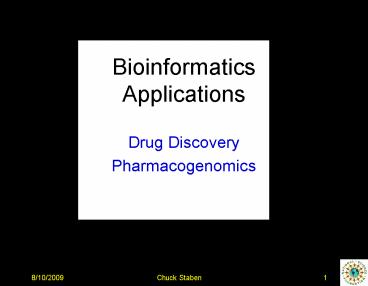Bioinformatics Applications - PowerPoint PPT Presentation
1 / 25
Title:
Bioinformatics Applications
Description:
process found in cancer, not normal. rapid DNA replication, eg. ... Codeine, tramadol (Ultram) Inhibitors. Antidepressants. sertraline (Zoloft) Cimetidine (Tagamet) ... – PowerPoint PPT presentation
Number of Views:139
Avg rating:3.0/5.0
Title: Bioinformatics Applications
1
BioinformaticsApplications
- Drug Discovery
- Pharmacogenomics
2
Pharmaceutical Industry
- 100,000,000,000 worldwide yearly
- 78 prescription
- 20 over-the-counter
- 2 diagnostics
- RD expenditure
- ??10 billion
3
Drug Discovery
Refine
4
Drug Approval
Discovery
5 years
Pre-clinical
1 year
Clinical
6 years
Review
2 years
5
Drugs-Therapeutic Categories
- Inflammatory/Immunological (50B)
- Cardiovascular (20B)
- Metabolic/endocrine (15B)
- Anti-infectives (20B)
- Oncology (7B)
- Neurological
- Pain
Viagra!
6
Anti-infectives
- Anti-bacterial, for example
- Non-toxic to humans
Target-driven
Compound-driven
7
Target Paradigm-Bioinformatics
- Present in all target pathogens
- Expressed
- growing vs non-growing?
- Essential
- growth vs survival
- Absent in humans
- Not expressed in target tissue?
Other Criteria?
Target Validation
8
Target Refinement
- Known drug target in this class?
- Known structure in class?
- Develop assay/high throughput screen
- refine differential screens?
- Determine target properties
- structure, binding/catalytic properties
- STRUCTURE BASED DESIGN
9
Oncogenic Target
- Normal vs transformed cells
- process found in cancer, not normal
- rapid DNA replication, eg.
- process unique to normal, not cancer
- loss of differentiated characteristic
- receptor response, etc.
10
Anti-inflammatory
Sketch Pad -Class input
11
Compound Paradigm
- HTS to find active compounds
- whole cell assays?
- Bioinformatics and genomics to find targets!
- refine targets/compounds
Expression screening
Overexpression protection
12
Combinatorial Chemistry
- Arrayed chemistries (1992)
- parallel automated syntheses
- permuted chemical libraries
- Can be biased by lead compounds, selected
chemistries
Millions of compounds
13
High Throughput Screens
- 100,000 assays/day per system
- Require microminiaturization
Microfluidics Lab-on-a-chip
14
HTS/Preclinical Issues
- Pharmacokinetic issues
- bulk transport, uptake, efflux, metabolism
- Tissue specificity
- Genetic/environmental variability
15
Clinical Trials
- Phase I 50-100 subjects for toxicology
- Phase II 100-300 patients for efficacy, dose,
safety - Phase III 1000-3000 patients for efficacy,
safety
MAJOR Expense
16
Pharmacogenomics
- Pharmacogenomics is the science of understanding
the correlation of an individual's genetic
make-up to his or her response to drug treatment.
- Understanding the genetic cause of differences in
response will be useful in stratifying patient
populations for clinical trials, accelerating
timelines and reducing costs during clinical
development.
17
FDA Gold Mine
"Identifying metabolic differences in patient
groups based on genetic polymorphisms, or on
other readily identifiable factors such as age,
race, and gender, could help guide the design of
dosimetry studies for such populations groups.
This kind of information also will provide
improved dosing recommendations in product
labeling, facilitating the safe and effective use
of a drug by allowing prescribers to anticipate
necessary dose adjustments. Indeed, in some
cases, understanding how to adjust dose to avoid
toxicity may allow the marketing of a drug that
would have an unacceptable level of toxicity were
its toxicity unpredictable and unpreventable."
18
Side Effects
- 90 of drug candidates fail in pre-clinicals
- 90 of remainder fail in clinical-many due to
side effects - Estimates of NSAID ulcers
- more deaths/year than due to melanoma, cervical
cancer combined!
19
Pharmacogenomic Loci
- Metabolism Variation
- Drug Target Variants
- Disease Pathway
20
Metabolism Variants
- Cytochrome P450s
- CYP2D6, (10 Caucasian)
- 3A4,2C19
- N-acetyltransferases (NAT1, NAT2)
- 40-60!, isoniazid toxicity
21
CYP2D6
Substrates Antidepressants Amitriptyline
(Elavil) Doxepin (Adapin, Sinequan) Fluoxetine
(Prozac) Paroxetine (Paxil) . Antipsychotics
Haloperidol (Haldol) ... Beta blockers
Propranolol (Inderal) Timolol (Blocadren)
Narcotics Codeine, tramadol (Ultram)
Inhibitors Antidepressants sertraline (Zoloft)
Cimetidine (Tagamet) Fluphenazine (Prolixin)
Antipsychotics Haloperidol Perphenazine
25 all drugs 10 population
22
Target/ Disease Pathway Variation
- 5-HT2A Receptor clozapine (antipsychotic)
- 5-HTT (serotonin uptake)
- variant associated with anxiety
- need for/success with Prozac?
- Apo4E
- ? risk, Alzheimers AND ? effect ACE inhibitors
- CETP, LPL, ?-fibrinogen (cholesteryl ester
transfer protein, lipoprotein lipase) - ? response to HMG-CoA inhibitors (parvastatin)
AND ? risk of atherosclerosis
23
Pharmacogenomic Loci
- Association Studies
- 100,000 SNP markers, 1000 individuals
- QTL traits!
- Other Strategies??
Medical Informatics??
24
Bioinformatics-GenomicsTherapy Evaluation
- Gene Expression correlate with clinical
progress/toxicity - transcriptome level
- proteome level
25
Improved Drug Development Model
Drugs
Costs

